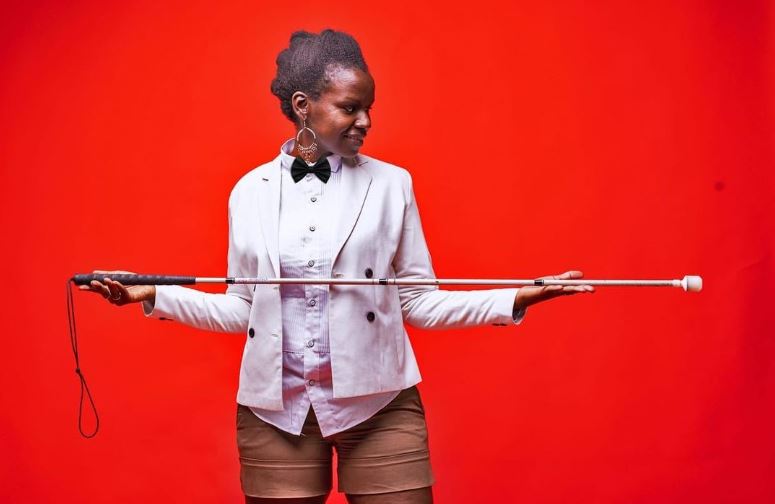
Asige, who runs YouTube Channel ‘Blind Girl Manenos’, is also an advocate and an activist for people with disabilities. The talented songbird has been using her platforms to create awareness and debunk the stigma associated with disability.
She recently shared up to 15 insightful tips on how to speak and act around visually impaired people(VIP) and people with disability(PWD).
“Don’t avoid impactful connections or pleasant interactions because you do not know how to speak, or act around visually impaired people. These tips have been inspired by Kilimanjaro Blind Trust Africa – thanks for the tag and here we go:
1. Speak to the VIP directly, rather than referring to their guide/companion when in conversation. This includes not answering on our behalf either. We can hear too!
2. Be as descriptive as possible to a VIP. This means describing things, spaces, social situations and small things like facial expressions and body language when out and about. This really helps us feel included in moments and helps us imagine the scene around us.
3. If you don’t interact with that VIP often or haven’t done in a long time, say your name when greeting them so they know to whom they are speaking.
4. Before leaving a conversation, especially in groups like a meeting, say that you’re leaving so they know who is left in the room.
5. Don’t rely on what you think you know about how to assist a VIP because of what you saw on TV, or read in books – instead ask them ‘how can I help?’
6. Don’t make a big deal out of small things like a VIP finding the washroom, pouring you a cup of tea, or walking up the stairs without help! These are not life-changing achievements, we don’t need a song and dance about it please – it’s very patronising.
7. If you would like to hang out or spend quality time with a VIP, suggest something thoughtful like; coming over to read them their fave book or the morning newspaper. Go for a walk somewhere spacious like a park, Forest Trail or the beach where they don’t have to worry about human traffic, falling, bumping into things. Watching a movie together (especially if you can find one with audio description). A comedy night. A dance class. Tandem biking where you lead. Really the options are endless!
8. If you’re out and a VIP has assured you that they are fine where they are, don’t keep asking and feeling like they must be bored. Remember, we see with our ears and cannot be as energetic moving around the space like you. Sometimes it’s just that we enjoy taking it all in that way.
Here are a few more to be aware of when interacting with the disabled community.
1. You may have heard The acronym PWD flying around; this means Person With Disability. Please, please do not say person LIVING with disability, The principle being that we don’t say person ‘living’ with blackness for example, because it has the connotation of us ‘tolerating’ or putting up with our disability. The fact is, it is part of who we are, an extension of us.
2. There are of course many nuances because of the complexities involved with individual personalities, sensitivities and contexts of a PWD, so always remember the PLATINUM rule of ‘treat people the way they want to be treated’, Not the way you think they should be treated”.
3. Do not address or or ask many questions straight out the gate about our disability! Let us bring it up when ready, we are a person first. To be frank, yes I have a disability, but that’s not the most interesting thing about me! If it needs to be addressed, be respectful – Pay attention to how we refer to ourselves and follow suit.
4. Be patient. Do not condescend. Do not stare.
5. A friendly touch on the shoulder, forearm or hug etc is a nice gesture. It communicates that you do not consider us ‘untouchable’ which is what many PWDs are programmed to believe when people hide their children from us, cross the road, ignore in conversation, go silent when we are around.
6. Be conscious of using words to describe us such as; unable, bedridden, mental, invalid, handicapped, wheelchair-bound, challenged, unlucky, sick, crippled, deformed, defected or ‘these people’. PWDs are not lab experiments gone wrong.
7. Also as important is being conscious of how you use opposite words such as; normal, healthy, able-bodied, special (and my personal favourite ‘differently-abled’). Hard to explain a post, but in general please stay self-aware with your attitude and heart posture when speaking. Every word has the power of life and death
source http://nairobiwire.com/2020/11/15-tips-for-interacting-with-visually-impaired-people-persons-with-disability-crystal-asige.html
No comments:
Post a Comment